|
Coastal
Geothermal has added this page as a consumer guide to what
a "Geothermal System" actually is. It really isn't as complicated as it sounds and there
are so many benefits, not only to the consumer, but to our earth and future as well. We will touch on some of the more
basic elements and design features offered with a Geothermal System and hopefully answer some of the most common questions people
have. If you still can't seem to understand it, please feel free to call our office at (910) 353-9026 OR e-mail
Mike Hadley (our Certified GeoExchange Designer) at: mhadley@bizec.rr.com for more information!

What is a geothermal system?
A geothermal system is a heat exchanger that uses the earth or ground water or both as sources
of building heat in the winter and as a "sink" for heat removed from a building in the summer. The system provides heat
by removing it from the earth through a liquid such as ground water or an antifreeze solution, which is upgraded by the heat
pump and transferred to indoor air. The system provides cooling by reversing the process.
| SUMMER |
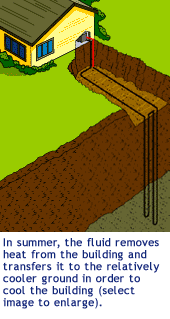
|
| WINTER |
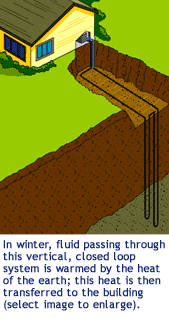
|
The basic elements of a geothermal heat pump (GHP) system
include:
Ground Loop - a system of fluid filled plastic tubes buried in the
shallow ground, or place in a body of water, such as a pond, near the building.
Heat Pump - removes the heat from the fluid in the plastic tubes, concentrates
it, and then transfers it to the building. The process is reversed for cooling.
Air Delivery System - conventional ductwork that is used to distribute
the heated or cooled air throughout the building.
The GHP takes heat from a warm area and
exchanges the heat to a cooler area, and vice versa. The wonderful benefit of such as system is that it can be used
for both heating and cooling. Which means doing away with the need for separate furnace and air-conditioning units AND
for free hot water heating during the summer months.
Geothermal heat pumps use electricity
to heat and cool, just like a conventional heat pump. BUT, unlike a conventional heat pump, the GHP system uses the
relatively constant temperature of the Earth as a source of heat in the winter and a repository for heat in the
summer.
In the winter, the fluid traveling through
the underground (or water) loops of pipes is warmed by the Earth's heat. The collected heat is removed and concentrated
by the heat pump, and distributed through the building's ductwork.
To cool the building in the summer, this
process is reversed--- the heat pump removes the heat from the indoor air into the ground loops, where it is transferred to
the much cooler ground. The heat removed from the air during the summer can also be used to produce some of your hot
water, or to heat swimming pools, instead of transferring to the ground.
What makes a GHP system energy efficient?
The geothermal system
uses renewable energy as a source
of energy. It is nothing more than absorbed solar energy from the sun. The Earth
absorbs about 50% of the sun's that reaches the Earth's surface, therefore, it renews itself constantly.
A geothermal heat pump is four to five times more efficient in fuel conversion
than a gas furnace. One benefit of the "super efficiency" is the longer lifespan of the equipment. The lifespan
of a geothermal unit is estimated to be 22 years by the U.S. Department of Energy. The most energy-efficient central heat and air and the highest rated HVAC units are by far are the geothermal
heating and cooling systems.
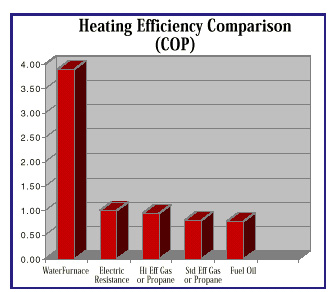 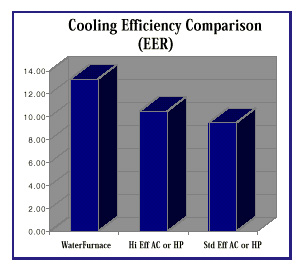
What types of GHP's are there?
Geothermal heat pumps are generally classified as "closed-loop"
or "open-loop" systems based on the type of ground loop used.
Closed-loop System - these systems circulate a solution of water and antifreeze through
a series of sealed loops. The loops can be installed in the ground horizontally or vertically, or they can be place
in a body of water, such as a pond.
Open-loop System - these systems circulate water drawn from a ground or surface water source.
Once the heat has been transferred in or out of the water, the water is returned to a well or surface discharge.
Among
these are a few different ways to install these loop systems. Vertical, horizontal, pond and & open loop designs.
Let's take a look at these types of designs a little more closely.
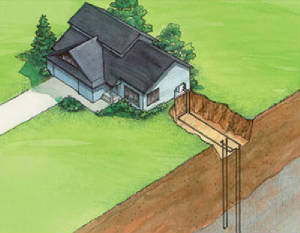
Vertical Loop
Vertical loops are used when space is limited. Holes
are bored using a drilling rig, and a pair of pipes with special u-bend fitting is inserted into the holes. A typical
home requires 3 to 5 bores with about a 15-foot separation between the holes.
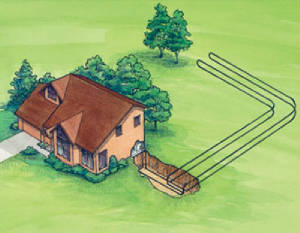
Horizontal Loop
Used where adequate land is available, horizontal loops involve one or more trenches that
are dug using a backhoe or chain trencher. Polyethylene pipes are inserted, and the trenches are backfilled. A
typical home requires 1/4 to 3/4 of an acre for the trenches.
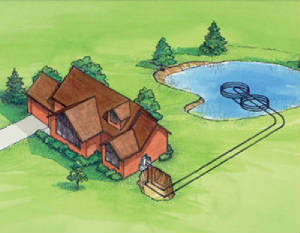
Pond Loop
If an adequately sized body of water is close to your home, a pond loop
can be installed. A series of loops can coiled and sunk to the bottom. A 1/2 acre, 8-foot-deep pond is usually
sufficient for the average home.
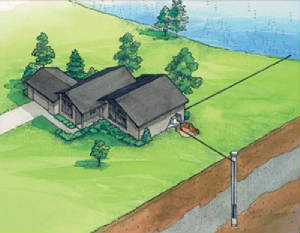
Open Loop
An open loop is used where there is an abundant supply of quality well
water. The well must have enough capacity to provide adequate flow for both domestic use and the geothermal unit.
The success
of a GHP is directly related to the quality of the geothermal heating and cooling installation. DO NOT let any company
install your geothermal system that does not have adequate experience. Always ask for references.
Coastal Geothermal has been installing GHP's
since 1994. Our technicians are certified and experienced. We also have a
"Certified GeoExchange Designer and an IGSHPA Accredited Trainer & Installer" on the premises
(which actually, he is our President of the company, Mr. Mike Hadley) so you'll know
without a doubt that when you call Coastal Geothermal
you are getting EXCEPTIONAL sales, service & installation of your new geothermal system.
|

